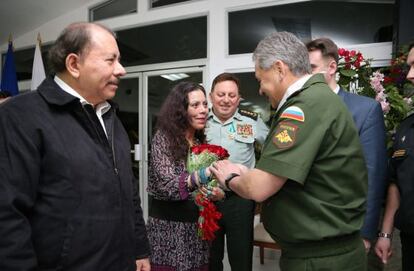Nicaragua’s President Ortega keeping power in the family
Critics say leader is violating Constitution by naming wife and children to posts


When Nicaraguan President Daniel Ortega attended a regional summit in Costa Rica last January, he named his wife Rosario Murillo “foreign minister at large.” His two daughters accompanied the couple as special advisors, while a son went to the conference holding a ministerial post.
With this family trip, Ortega allowed the international community to observe the extent to which nepotism operates in his Sandinista government.
Since he was re-elected president in 2007 after three decades in opposition, Ortega has appointed the first lady to various posts, including his spokeswoman and chief of the Citizens Communications Council, which allowed her to control state-funded advertisements in local media outlets.
First lady Rosario Murillo has held various government posts since her husband was re-elected in 2007
She has also played key roles in deciding Cabinet posts, organizing official events on behalf of the Sandinista Front, and handling natural disaster emergencies.
But with this new appointment, many believe Murillo may take international policy matters away from Foreign Minister Samuel Santos.
Ortega has 24 special presidential advisors, including his daughters Luciana and Camila and son Rafael. Laureano Ortega Murillo, another son, was put in charge of handling the negotiations between the government and Chinese businessman Wang Jing for the construction of a canal that the president is building to connect the Caribbean with the Pacific and compete with the Panama Canal.
Ortega Murillo has also headed up diplomatic missions to China and Russia, and came back from Moscow with a pledge for food aid and military support to fight drug trafficking.
To some experts, Ortega’s decision to name family members to government posts violates the Constitution but nonetheless follows a deep-rooted tradition in Nicaragua where nepotism was rampant during the Somoza dictatorship. When the Somozas controlled the country from 1936 to 1979, the presidency was shared between Anastacio Somoza García and his two sons – Luis and Anastacio Jr “Tacho.”
“This practice dates back to the colonial days,” explains political analyst Carlos Tünnermann. “Pedro Arias de Ávila, the first governor of Nicaragua, devised it so that his son-in-law, Rodrigo de Contreras, could succeed him.”
Tünnermann calls nepotism part of Nicaragua’s “backward political culture.” “The heads of state view power as their own personal patrimony and don’t see anything wrong with family members sharing it.”
Constitutional expert Azahalea Solís charges that Ortega has violated Article 130 of Nicaragua’s Constitution, which prohibits public servants, including the president, from naming family members to official posts.
The opposition cannot demand the family give up its posts because it does not control the National Assembly
Solís added that the president also violated Article 138, which states that all ministerial appointments must be approved by the National Assembly – a step that was not observed in Murillo’s case.
“Ortega’s government is like a feudal, absolute monarchy,” she said.
Opposition Deputy Eliseo Núñez, of the Independent Liberal Party (PLI), said Ortega had also violated the country’s public servants laws.
“It looks like we are giving birth to a new dynasty here in Nicaragua. Ortega says: ‘My family is a family of power,’ which can be seen that we are heading in a direction where there will be a chain of family successions. This is a new version of Somozacism.”
Because Ortega’s Sandinista Party and its supporters control the National Assembly, it is difficult for the opposition to demand his family members to give up their positions. But what concerns many analysts is Nicaragua’s international image.
During the January summit of the Community of Latin American and Caribbean States (CELAC) held in Costa Rica, Ortega named the leader of the Puerto Rican Independence Party (PIP), Rubén Berríos, to represent him during a private meeting with other heads of state.
Costa Rican President Solís closed the CELAC regional summit early after Ortega broke protocol
Berrios, a US citizen who was given a Nicaraguan passport and named Ortega’s advisor on decolonization issues, caused an uproar when Nicaragua broke protocol and allowed him to address the summit.
A clash between Costa Rica and Nicaragua broke out, which forced Costa Rican President Luis Guillermo Solís to cancel the private meeting of the heads of state and call an early end to the CELAC summit.
“Ortega showed other Latin American leaders his appeal for nepotism and how he doesn’t respect any laws,” said Tünnermann.
Tu suscripción se está usando en otro dispositivo
¿Quieres añadir otro usuario a tu suscripción?
Si continúas leyendo en este dispositivo, no se podrá leer en el otro.
FlechaTu suscripción se está usando en otro dispositivo y solo puedes acceder a EL PAÍS desde un dispositivo a la vez.
Si quieres compartir tu cuenta, cambia tu suscripción a la modalidad Premium, así podrás añadir otro usuario. Cada uno accederá con su propia cuenta de email, lo que os permitirá personalizar vuestra experiencia en EL PAÍS.
En el caso de no saber quién está usando tu cuenta, te recomendamos cambiar tu contraseña aquí.
Si decides continuar compartiendo tu cuenta, este mensaje se mostrará en tu dispositivo y en el de la otra persona que está usando tu cuenta de forma indefinida, afectando a tu experiencia de lectura. Puedes consultar aquí los términos y condiciones de la suscripción digital.








































